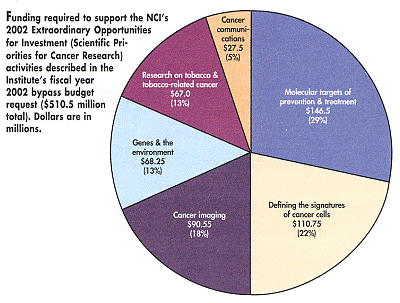NCI Seeks a $5.03 Billion Budget for Fiscal Year 2002
BETHESDA, Md-The National Cancer Institute has requested $5.03 billion in its "bypass budget" for fiscal year 2002, which begins Oct. 1, 2001. The request represents an increase of $1.525 billion over the $3.5 billion President Clinton asked Congress to provide the Institute for FY 2001, and $1.27 billion above the actual FY 2001 appropriation granted by Congress ($3.76 billion).
BETHESDA, MdThe National Cancer Institute has requested $5.03 billion in its "bypass budget" for fiscal year 2002, which begins Oct. 1, 2001. The request represents an increase of $1.525 billion over the $3.5 billion President Clinton asked Congress to provide the Institute for FY 2001, and $1.27 billion above the actual FY 2001 appropriation granted by Congress ($3.76 billion).
The NCI budget request is unique in the federal government, in that the agency, by law, bypasses the White House Office of Management and Budget and sends its annual request for funds directly to the President and Congress. The agency has never received the full amount contained in its bypass budget, although it is in the third year of what its supporters in Congress hope will be a doubling of funds over 5 years.

In its FY 2002 request, NCI said it would need an additional $203.6 million because of inflation just to maintain its same level of operations. It also sought an additional $810.7 million to support new activities and infrastructure, and $510.5 million to fund extraordinary opportunities and scientific priorities in cancer research.
The funding request includes $2.34 billion for research project grants, $621 million more than the President’s FY 2001 budget, as well as $269.7 million to support cancer centers, $389.4 million for NCI’s Cooperative Groups, and $170.9 million for its Community Clinical Oncology Programs. The latter three areas represent increases of $88 million, $234.7 million, and $101 million, respectively, over the President’s FY 2001 budget.
Most of the NCI request would support basic and clinical research73% for the extramural program and 16% for the intramural program. The remainder of the budget request includes training and education (4%), research management and support (4%), and cancer communications (3%).
NCI wants a significant increase in its cancer centers budget so that it can fund additional centers and other facilities. It also wants to spend more for developing and testing new cancer therapies "and increasing access to and participation in clinical trials," the Institute said.
In addition, it wants to expand cancer surveillance programs to monitor progress in cancer-control programs and to explore potential causes of cancer both nationally and among specific ethnic, racial, and cultural groups.